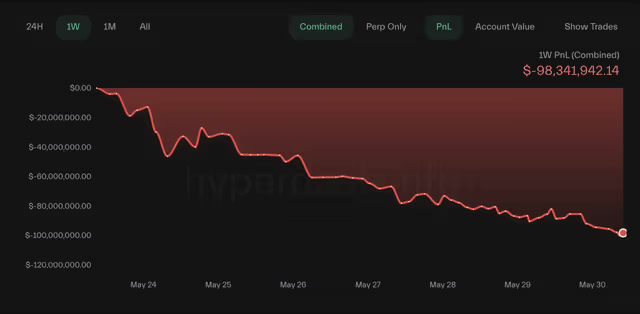June 2, 2025 –
James Wynn, once hailed as a rising star in the world of digital asset investing, has become the latest cautionary tale in a long history of overleveraged ambition. The collapse of his $100 million crypto-focused fund in under 72 hours sent shockwaves across trading desks and social media—and offered a stark reminder of the dangers that come with unchecked leverage in volatile markets.
From Genius to Margin Call
Wynn, a former derivatives trader at a top-tier Wall Street firm, launched Wynn Capital in 2023 with a focus on aggressive yield strategies in decentralized finance (DeFi). His high-risk, high-reward approach was initially met with fanfare. With slick marketing, insider connections, and a track record of beating the market during bull runs, the fund grew rapidly to manage over $100 million by early 2025.
But behind the scenes, Wynn’s strategy relied heavily on leverage—borrowing against assets to multiply potential gains. According to internal documents and blockchain data, the fund routinely borrowed up to 8x its collateral base to amplify bets on Ethereum derivatives, illiquid altcoins, and exotic structured products offered by DeFi platforms.
When Ethereum’s price dipped below $2,500 last week and volatility spiked, Wynn’s positions began to unwind.
A Rapid Unraveling
On-chain analytics firm Arkham Intelligence tracked over $60 million in liquidations from wallets tied to Wynn Capital in a 36-hour span. As crypto prices fell and funding rates reversed, the fund’s collateral was marked down sharply. DeFi lending platforms, operating via automated smart contracts, began force-liquidating positions as margin thresholds were breached.
Wynn reportedly attempted to inject personal capital to stop the bleed, but it was too late. The cascade of forced sales only deepened losses, triggering what some have called the largest individual fund implosion in crypto so far this year.
By the end of the week, Wynn Capital’s on-chain holdings had been reduced to less than $3 million.
A Story We’ve Seen Before
Wynn’s collapse is eerily reminiscent of other infamous blow-ups in financial history—from Long-Term Capital Management in 1998 to Archegos Capital in 2021. In each case, the combination of excessive leverage, market overconfidence, and liquidity mismatches proved fatal.
Crypto markets, with their round-the-clock trading, automated liquidation mechanisms, and extreme volatility, are even less forgiving than traditional finance.
“Leverage is a double-edged sword,” said Anita Rajan, a risk analyst at Delphi Digital. “In crypto, the blade is sharper and it swings faster.”
The Fallout and Industry Reaction
The implosion has sparked renewed debate about leverage limits, transparency, and risk management in the crypto hedge fund space. While Wynn Capital was not a publicly regulated entity, its collapse affected multiple counterparties, including DeFi protocols that provided lending capital and LPs who entrusted him with millions.
Several funds are reportedly reviewing their risk models in light of the incident, and at least two decentralized lending platforms have introduced emergency governance proposals to cap borrowing ratios and introduce new safeguards.
What Comes Next for Wynn?
James Wynn has not made any public statements since the collapse. Multiple sources say he is under informal investigation by financial regulators, though no wrongdoing has been formally alleged.
Insiders suggest Wynn may attempt to stage a comeback in some form, though rebuilding trust in a tightly knit industry known for quick reputational shifts will be no small task.
“He was brilliant, no doubt,” said one former colleague who spoke under condition of anonymity. “But brilliance without discipline is just another implosion waiting to happen.”


 Bitcoin
Bitcoin  Ethereum
Ethereum  XRP
XRP  Tether
Tether  Solana
Solana  USDC
USDC  Dogecoin
Dogecoin  Lido Staked Ether
Lido Staked Ether  Cardano
Cardano  TRON
TRON  Wrapped stETH
Wrapped stETH  Chainlink
Chainlink  Hyperliquid
Hyperliquid  Wrapped Bitcoin
Wrapped Bitcoin  Sui
Sui  Ethena USDe
Ethena USDe  Stellar
Stellar  Figure Heloc
Figure Heloc  Avalanche
Avalanche  Wrapped eETH
Wrapped eETH  Bitcoin Cash
Bitcoin Cash  WETH
WETH  Hedera
Hedera  Litecoin
Litecoin  LEO Token
LEO Token  Cronos
Cronos  Shiba Inu
Shiba Inu  Toncoin
Toncoin  USDS
USDS  Coinbase Wrapped BTC
Coinbase Wrapped BTC  Polkadot
Polkadot  Binance Bridged USDT (BNB Smart Chain)
Binance Bridged USDT (BNB Smart Chain)  WhiteBIT Coin
WhiteBIT Coin  Uniswap
Uniswap  Ethena Staked USDe
Ethena Staked USDe  World Liberty Financial
World Liberty Financial  Mantle
Mantle  Ethena
Ethena  Monero
Monero  Pepe
Pepe  Aave
Aave  Bitget Token
Bitget Token  Dai
Dai  OKB
OKB  MemeCore
MemeCore  Jito Staked SOL
Jito Staked SOL  NEAR Protocol
NEAR Protocol  Bittensor
Bittensor  Ondo
Ondo  Ethereum Classic
Ethereum Classic  Worldcoin
Worldcoin  Aptos
Aptos  Story
Story  Pi Network
Pi Network  POL (ex-MATIC)
POL (ex-MATIC)  Binance Staked SOL
Binance Staked SOL  Arbitrum
Arbitrum  USDT0
USDT0  Binance-Peg WETH
Binance-Peg WETH  Internet Computer
Internet Computer  USD1
USD1  Pump.fun
Pump.fun  MYX Finance
MYX Finance  Pudgy Penguins
Pudgy Penguins  Cosmos Hub
Cosmos Hub  Algorand
Algorand  BlackRock USD Institutional Digital Liquidity Fund
BlackRock USD Institutional Digital Liquidity Fund  Jupiter Perpetuals Liquidity Provider Token
Jupiter Perpetuals Liquidity Provider Token  VeChain
VeChain  Kinetiq Staked HYPE
Kinetiq Staked HYPE  Rocket Pool ETH
Rocket Pool ETH  Render
Render  Gate
Gate  Sei
Sei  KuCoin
KuCoin  sUSDS
sUSDS  Bonk
Bonk  Official Trump
Official Trump  USDtb
USDtb  Filecoin
Filecoin  Artificial Superintelligence Alliance
Artificial Superintelligence Alliance  StakeWise Staked ETH
StakeWise Staked ETH  Falcon USD
Falcon USD  Sky
Sky  BFUSD
BFUSD  Jupiter
Jupiter  Liquid Staked ETH
Liquid Staked ETH  Lombard Staked BTC
Lombard Staked BTC  Quant
Quant  Optimism
Optimism  Polygon Bridged USDT (Polygon)
Polygon Bridged USDT (Polygon)  Renzo Restaked ETH
Renzo Restaked ETH  Celestia
Celestia  Injective
Injective  Tether Gold
Tether Gold  Jupiter Staked SOL
Jupiter Staked SOL  PayPal USD
PayPal USD  SPX6900
SPX6900  Mantle Staked Ether
Mantle Staked Ether  Immutable
Immutable  NEXO
NEXO  Wrapped BNB
Wrapped BNB  Stacks
Stacks  Sonic
Sonic  Solv Protocol BTC
Solv Protocol BTC  Curve DAO
Curve DAO  Lido DAO
Lido DAO  Aerodrome Finance
Aerodrome Finance  syrupUSDC
syrupUSDC  Marinade Staked SOL
Marinade Staked SOL  The Graph
The Graph  PAX Gold
PAX Gold  Binance Bridged USDC (BNB Smart Chain)
Binance Bridged USDC (BNB Smart Chain)  Super OETH
Super OETH  FLOKI
FLOKI  Four
Four  Pyth Network
Pyth Network  Arbitrum Bridged WBTC (Arbitrum One)
Arbitrum Bridged WBTC (Arbitrum One)  dogwifhat
dogwifhat  Kaia
Kaia  Raydium
Raydium  Conflux
Conflux  Saros
Saros  Fartcoin
Fartcoin  cgETH Hashkey Cloud
cgETH Hashkey Cloud  PancakeSwap
PancakeSwap  clBTC
clBTC  Virtuals Protocol
Virtuals Protocol  Pendle
Pendle  Theta Network
Theta Network  Tezos
Tezos  GALA
GALA  L2 Standard Bridged WETH (Base)
L2 Standard Bridged WETH (Base)  Zcash
Zcash  Ethereum Name Service
Ethereum Name Service  IOTA
IOTA  The Sandbox
The Sandbox  Jito
Jito  Binance-Peg Dogecoin
Binance-Peg Dogecoin  JasmyCoin
JasmyCoin  Ripple USD
Ripple USD  OUSG
OUSG  Decentraland
Decentraland  Stader ETHx
Stader ETHx  Ether.fi
Ether.fi  ether.fi Staked ETH
ether.fi Staked ETH  Flow
Flow  tBTC
tBTC  Stables Labs USDX
Stables Labs USDX  Ondo US Dollar Yield
Ondo US Dollar Yield  Arbitrum Bridged WETH (Arbitrum One)
Arbitrum Bridged WETH (Arbitrum One)  Aethir
Aethir  AB
AB  BitTorrent
BitTorrent  Coinbase Wrapped Staked ETH
Coinbase Wrapped Staked ETH  Walrus
Walrus  Mantle Restaked ETH
Mantle Restaked ETH  Swell Ethereum
Swell Ethereum  Beldex
Beldex  Global Dollar
Global Dollar  Loaded Lions
Loaded Lions  Usual USD
Usual USD  Starknet
Starknet  EigenCloud (prev. EigenLayer)
EigenCloud (prev. EigenLayer)  Brett
Brett  Vision
Vision  Avalanche Bridged BTC (Avalanche)
Avalanche Bridged BTC (Avalanche)  Bitcoin SV
Bitcoin SV  Maple Finance
Maple Finance  BUILDon
BUILDon  dYdX
dYdX  BENQI Liquid Staked AVAX
BENQI Liquid Staked AVAX  Polygon PoS Bridged WETH (Polygon POS)
Polygon PoS Bridged WETH (Polygon POS)  Bybit Staked SOL
Bybit Staked SOL  ApeCoin
ApeCoin  TrueUSD
TrueUSD  USDD
USDD  Arweave
Arweave  Telcoin
Telcoin  Helium
Helium  NEO
NEO  Fluid
Fluid  Reserve Rights
Reserve Rights  Mantle Bridged USDT (Mantle)
Mantle Bridged USDT (Mantle)  Core
Core  Keeta
Keeta  Superstate Short Duration U.S. Government Securities Fund (USTB)
Superstate Short Duration U.S. Government Securities Fund (USTB)  THORChain
THORChain